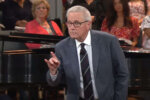Europe was cruel to Jews, but many of them today are finding God’s love through the ministry of Messianic Jewish believers.
Joel Guenoum has warm memories of growing up in a Jewish community in the heart of Paris. Though his family wasn’t particularly religious, the 30-year-old high school physics and chemistry teacher does remember eating kosher food, celebrating Jewish holidays and being honored at his bar mitzvah. He remembers taking pride in his heritage as a descendent of Abraham, Isaac and Jacob, and sharing an affinity with historic events such as the Holocaust.
But Guenoum also remembers feeling drawn to a mysterious part of his Jewish heritage: Jesus Christ.
Bernard Kohn, a 46-year-old Parisian wholesaler, has fond memories of his Jewish heritage, too, especially after he spent a month in Israel bonding with the country of his ancestors. He vividly remembers his grandmother telling World War II stories about his aunt who was deported to a German concentration camp and never seen again. Although stories like these stirred a passion for his people, hearing stories years later about Messianic prophecies fulfilled in the person of Jesus Christ stirred a far greater passion.
Guenoum and Kohn are two of 700,000 Jewish descendants who are citizens of France, who make up about 1 percent of the country’s 58.6 million people. With 350,000 Jews in Paris; 100,000 in Marseilles; 25,000 in each of Lyon, Nice and Toulouse; and the rest scattered throughout the country, France contains the third largest Jewish population in the world (with the United States first and Israel second).
About 70 percent of French Jews are North African Sephardim, primarily from the former French colony Algeria and the former French protectorates Tunisia and Morocco. After these countries gained their independence in the late 1950s and early 1960s, the Jews were forced out of the Muslim nations and moved to France or Israel. The remainder of France’s Jews are Ashkenazim, who developed in western Europe after the fall of the Roman Empire.
Most of France’s Jewish population are nonreligious, meaning they don’t attend synagogue regularly and may not even celebrate Jewish holidays or send their children to Jewish schools. Statistics released by the Jewish community indicate that in 2001 only 13 percent of Jews attended services for Yom Kippur, the most popular Jewish holiday of the year.
That won’t surprise anyone who knows France. Just as the majority of the French are Roman Catholic by culture rather than by conviction, the majority of French Jews are Jewish by blood rather than by belief. They may be stirred by passion for the Israeli state (many have relatives there) and maintain some Jewish traditions in their homes, but to a large degree, their Jewish ancestry does not motivate them to embrace the God of their fathers.
A Shared Rejection of Jesus
One philosophy that almost all French Jews embrace is a shared belief that Jesus Christ is not the promised Messiah. Although most French Jewish families have lived in a Roman Catholic Christian culture for decades, less than one-tenth of 1 percent–fewer than 700–are Messianic believers.
This small minority of French Messianic believers are scattered throughout the country in various Protestant and evangelical churches and Messianic Jewish synagogues. A people with three identities–that of the Jew, the French and the Messianic believer–most of them struggle with being misunderstood by their families, by nonbelieving Jews and by the French church.
Guenoum, for example, is concerned about how his mother will take the news of his conversion to evangelical Christianity. Guenoum’s Catholic wife is even more concerned that her husband’s family will blame her for the conversion.
Kohn, a new believer, hasn’t talked about his newfound faith with his family either. “In their eyes, if you become Christian, you aren’t Jewish anymore,” he says.
Jewish believers are also subject to persecution by other Jews, especially extremist groups. Joshua Turnil, a Jews for Jesus staffer in Paris, was alone at the office one evening when seven men dressed in black broke in, ransacked the office and beat Joshua, threatening to kill him if he continued his missionary work. Turnil and Stephen Pacht, director of Jews for Jesus-France, also have been beaten and threatened while street evangelizing in Paris, all by young Jewish men who believe that Messianic Jews are a threat to Zionism.
Unfortunately, the French church doesn’t make it easy on Messianic believers either. According to leaders with Chosen People Ministries of France, more than half of the evangelical churches in France teach replacement theology, a doctrine that states the church has replaced the Jewish people as God’s chosen race. As a consequence, Jews are often hidden within the French church.
“Many Jews who became believers were told not to consider themselves Jews any longer,” says Daniel Solomon, director of Chosen People. “In some, this created bitterness against their own Jewishness.” Several ministries in France serve the Jewish believer and the church in ministering to this identity crisis caused by the fusion of Judaism, Christianity and French church culture.
For some Jewish believers, joining a Messianic fellowship blends the identities in a way that makes sense.
“We share the same creeds as evangelicals, but the difference is that we include the existence of the state of Israel in the doctrine and fulfillment of prophecy in the Scriptures,” says Emmanuel Rodriguez, pastor of the Centre Messianique in Paris. “We also keep some of the traditional Jewish aspects in our worship services, including symbolism, feasts, and the worship and praise music.”
Rodriguez says there are six Messianic congregations in France. About one-third of the 180 people who attend Centre Messianique in Paris are Jewish, the remainder being Christians with a love for Israel. “Generally, Messianic Jews come out of the charismatic movement,” he says. “Healing, miracles and speaking in tongues are very normal for us.”
Chosen People finds that educating Jewish believers about the origin of the church and the specific vocation of Jewish people as the chosen race helps restore to them a passion for their natural identity.
Educating Messianic believers is just one part of the solution, according to Samuel Chevalier, chairman of Chosen People and pastor of a Federation Baptist church that reaches out to the Jewish community in Paris. “The majority of the church is not aware of the Jewish population,” Chevalier says. “To overcome this, we teach the French church about the place of the Jewish nation in the plan of God, looking at its heritage, roots and history in relation to the Jewish people.”
World War II Betrayal
A dark side of French history exacerbates this lack of awareness by the church. Both the Catholic Church and government turned deaf ears to the cries of the persecuted Jew and worse, sometimes participated in the horror.
Most memorably etched in the collective psyche of the French Jew is the unprovoked deportation of 150,000 of their relatives and friends during World War II, many at the hands of French police under the Vichy regime, which cooperated with the Germans. Fewer than 3,000 returned to France alive. “There is a feeling in France that the Catholic Church was silent during the war and didn’t help,” Pacht says.
Echoes of betrayal, pain and anger still linger. Turnil tells a story about witnessing to a man with memories of the past. “His response was, ‘If God exists, why did He allow my family to die in the ovens of Treblinka?'”
In 1995, President Jacques Chirac publicly asked for forgiveness of France’s part in the Holocaust. And in 1997, Catholic bishops took a step toward healing when they stood in Drancy, a Paris suburb where the main interment of Parisian Jews took place, and asked forgiveness for the silence of the church during the war.
But persecution remains a part of life for the French Jew. And it’s on the rise again because of the heightened conflict between Israel and Palestine. According to statistics provided by Jews for Jesus, incidents of publicly recorded acts of persecution have risen from less than 200 in the year 2000, to more than 300 in 2001. There were more than 300 in the first six months of 2002.
“Although the rise in persecution provides a positive opportunity for the church to reach out, most of the church doesn’t,” Pacht says. “Few pastors reach out in defense of the synagogues and the Jewish people.”
To understand the French church’s struggle to minister to the Jew, it is imperative to know the church’s struggle to reach out at all. “The church is a weak minority in a hostile environment,” according to the France 2001 Prayer Guide. “Churches are generally small [50-100 members on average] and spiritually weak. This creates a climate where divisions are common. The small Protestant community is divided into over 130 different denominations. It seems insignificant in a country with such a strong identity and developed culture.”
Anti-Religious Politics
The political climate is also against the French church. In 2001, the “About-Picard Bill” was passed by the French National Assembly to protect the public from “proselytizers, sects and cults” (including those termed “evangelical cults”). The law imposes penalties of fines and up to five years of imprisonment if deemed guilty of “mental manipulation.”
It is in this environment that French pastors and French-led ministries work to make Christ known to the Jews. And while they do not see large numbers come to Christ, they do see results.
Jews for Jesus focuses on street evangelism. Their staff evangelizes while wearing bright red “Jews for Jesus” T-shirts that invite questions and insults. Those who express interest in learning more about Christ are invited to Bible studies that explore the fulfillment of Old Testament prophecies through the New Testament Christ. After someone accepts Christ, they are discipled and encouraged to join a local body of believers.
This international organization also brought its worldwide Behold Your God campaign to the southwestern city of Toulouse in September 2001. The campaign consisted of evangelism including campus debates and open-air concerts. More campaigns are planned in Paris in 2003, also Marseilles, Lyon and Nice, Turnil says.
Evangelism is the focus of Shepherd of Israel, a journal published in French. Initiated in 1936, the journal has been published by Parisian Jacques Guggenheim since 1977 and today has a circulation of 12,000. “We preach the gospel among the Jews in France with appropriate vocabulary and illustrations,” says the 71-year-old Guggenheim.
Chosen People Ministries also focuses on evangelism through one-on-one witnessing and by publishing articles and making speeches.
With 700,000 French Jews in need of the Messiah, it may seem overwhelming to the few ministries and pastors who target the Jewish population. Rather than be discouraged, however, they find cause for hope in a renewed interest among French Jews in Christ as the Messiah.
For example, according to the France 2002 Prayer Guide, several well-known Jews have recently written books about Jesus. And Rodriguez has heard about a Parisian rabbi who believes that Christ is the Messiah.
Pacht, who spends many days on the streets of Paris talking to fellow Jews about Jesus, finds Jewish people more open to the gospel today than when he joined the ministry in 1992.
“Jewish people have become more aware that the gospel is an issue for them,” he says. “Jews are more open to the gospel today because they feel closer to Protestants. They know that Protestants are sympathetic to the Jewish cause in Israel and that like themselves, Protestants have also suffered persecution at the hands of the French.”
Proof of this openness is found in six Jewish men attending a weekly Jews for Jesus Bible study to learn more about Christ as the Messiah. This is where Guenoum and Kohn discovered their Messiah.
Kohn has been coming to the study for a year and says he reads the Bible every morning and every night. “I thirst for the Bible,” he told Charisma.
Guenoum was practicing yoga and meditating on a picture of Jesus when he decided to read the New Testament for himself. This made him more hungry. He discovered the Jews for Jesus Web site, called and was invited to attend the Bible study.
“Now,” he says, “I attend an evangelical church and hope to be baptized soon.”
Jeff Slaughter is an American writer living in Belgium. He is a regular contributor to Charisma.
JUDAISM
Adherents worldwide: 14 million
Largest concentrations: United States, Israel, France, former Soviet Union
History: There are three main branches of Judaism: Orthodox, Reform and Conservative. Orthodox Judaism began about the second century B.C. with the development of the Talmud–the authoritative body of Jewish tradition–and remained the only form of Jewish practice until the 18th century, when Reform Judaism was developed, in part, as an attempt to modernize Judaism. Conservative Judaism arose in America in the 19th century as a middle ground between the other two branches.
Core beliefs: Each branch of Judaism differs from the others regarding beliefs. Orthodox Jews believe that God is spirit, that He is personal and that man is perfected through observance of the Law of Moses. They believe that the Torah–the teaching of the Five Books of Moses–is truth. For Conservative Jews, the concept of God varies, but He is generally considered impersonal. They believe man is basically good but can achieve perfection through enlightenment. They see the Bible–including the books that make up the Torah–as the word of both God and man. Reformed Jews allow for different interpretations of the idea of God. They believe man is basically good but can maximize his potential through education and other means. And they consider the Bible a strictly human document.
About a third of all American Jews live in New York City–and some of them are finding Christ.
To many Christians, the term “evangelize” brings to mind an image of small groups of believers in T-shirts passing out tracts to homeless people or prostitutes in the inner city. But for Mitch Forman, director of the New York branch of Jews for Jesus, evangelization can take many forms, from one-on-one witnessing to Bible studies to cable TV programs.
His heart, and the goal of this branch of the organization, is to reach the almost 2 million Jews of New York City–about one-third of the Jewish population in the United States–with the gospel.
“New York City remains the center of Jewish life in the Diaspora,” Forman says.
No one wandering in the Boro Park area of Brooklyn would doubt the truth of this statement. There, says Susan Perlman, associate executive director of Jews for Jesus, “ultra-Orthodox Jews live amongst other Orthodox Jews. Your store merchants are all Jewish, your teachers are Jewish. You rarely venture into the world of the Gentiles.”
But it’s not the only part of the city with a high concentration of Jews. “Jewishness permeates New York City,” Perlman says. “Kippas [skullcaps] abound everywhere you go, from Wall Street to the Garment District. When the Jewish holidays arrive, the city is noticeably empty.”
The Jews are certainly not unobtrusive. According to Perlman, they have influenced everything from the language–“words like chutzpah, shtick are part of everyday conversation,” she says–to local politics.
“Being Jewish in New York is a badge of honor,” Perlman explains. “People do not shy away from expressing their Jewish heritage.”
This is the arena in which Forman and his fellow Jews for Jesus missionaries evangelize. “Over the years the New York branch has developed certain strategies to reach the diverse Jewish community,” he says.
Secular Jews–those who do not actively practice their religion–respond well to the “broadsides,” or gospel tracts, Jews for Jesus produces, Forman says. These hand-lettered pamphlets present the gospel in a humorous way using an informal, conversational tone. According to Forman, more than 35 million of the tracts have been distributed in New York since 1974.
Conservative Jews often grow up with a more religious background, but their kosher upbringing isn’t an assurance of spiritual fulfillment, Forman says. Many of them get in touch with Jews for Jesus through the organization’s witnessing campaigns, evangelistic programs, Web site or “Messiah Line”–a toll-free number for Jewish seekers–and receive ongoing, individual ministry from staff members.
Orthodox Jews are not as open to the gospel as the other groups and are as likely to try to convert the Messianic believers back to Judaism as they are to confess Christ, Forman admits. In fact, they have their own outreaches to try to get unaffiliated Jews into the synagogues. But he claims Jews for Jesus has “raised the banner for Yeshua for every Jew to see.”
The group places full-page ads in leading newspapers and magazines such as Newsweek, Parade and The New York Times that proclaim the gospel, as well as broadcasts evangelistic messages on billboards, in commuter trains, in bus transit-shelters and on secular radio stations. In addition, they regularly air two free evangelistic cable TV shows entirely in Hebrew in an attempt to reach the 100,000 Jewish Israelis in New York. Their expressed intent is to make the messiahship of Jesus “an unavoidable issue to the Jewish people via the secular media.”
Even the 350,000 Russian-speaking Jews, who have been arriving in New York in large numbers since the early 1990s, are being ministered to. “We have Bible studies in Russian in Queens and Brooklyn, and we will be adding a third in Staten Island this fall,” Forman says. “We have seen many Russian Jews come to faith in our Bible studies.”
Brooklyn pastor Alex Rivera hosts one of the studies at his church, Park Slope Christian Center. “I’ve always had a heart–as every believer does–for the Jewish people,” he says. “We’ve felt for a while that we wanted to open our church to the Russian Jews.”
Executive Director of Jews for Jesus David Brickner is focused as much on the mandate of evangelization as on the method. To him, sharing the gospel with Jews is imperative.
“Jews need to hear the gospel. Period,” he says. And in New York, Jews for Jesus is making certain they do.
Maureen D. Eha






Leave a Comment
You must be logged in to post a comment.